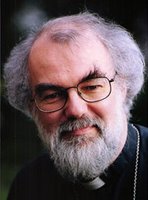
Wednesday, November 29, 2006
Tuesday, November 28, 2006
Killer, killer night
Comment on my last post (from someone, rather unnervingly, called “Killer”):
So, in honour of Killer...
The married and parent’s meeting went fairly well with some hearty sharing of heart and vision, although attendance was disappointing. (No doubt all these radical kingdom marrieds were looking after tots or having a cosy evening in. Or perhaps they were at the cinema. Because it’s important to have time together you know...)
The school assembly seemed to be received positively, although I have made a mental note to do something which doesn’t just involve a “talking head” next time.
The Sheffield Praise Day was an excellent day. Not without certain technical hitches (such as poor PA in one quarter of the hall and a lengthy and fairly important video which suffered from very poor dubbing). And yet the word of God shouted and vision was caught hold of.
Lastly, a word about last night (which I haven’t mentioned yet – but it has happened, Killer). Last night, was what we call “Elisha band” which is where pastors in the church (Elijahs) get together with their flock (Elishas). I was with eight sisters of varying ages. We spent most of the evening reflecting on Mary, the mother of Christ.
I’m tempted to leave it there and worry all my more vigorously Protestant friends. But I’d better explain.
(If Roman Catholics can sometimes give the impression that the entire New Testament is about Mary, Protestants, equally, can give the impression she isn’t mentioned there at all...)
Taking Mary as an (the?) example of godly womanhood, I taught through seven points about her from the New Testament and the sisters shared with each other in pairs in response to each point.
One: her name, “Mary”, means bitter. She was born in an oppressed people (which probably explains why there are so many Marys in the New Testament), acquainted with grief. Yet she responded with purity of heart (ironically, she was not bitter)...
Two: she said yes to God. “Let it be to me according to your word”. This radical obedience led to the salvation of the world.
Three: She rejoiced in God from her spirit.
Four: She treasured up things (bitter and sweet) and pondered them in her heart, becoming spiritually rich as a result.
Five: A “sword pierced her soul”. She was cut away from natural affection by the kingdom sword her own son brought. He rejected her in favour of God’s work. And she watched him die.
Six: she became mother to an apostle – honoured in the church. Spiritual motherhood is a high calling.
Seven: last mentioned in Acts 1, she “disappears” into the Body of Christ. True godly womanhood, spiritually rich and richly humble.
I think the sisters found Mary inspiring. I certainly did.
I've noticed that your last 3 blog entries have been about things that are about to happen but you haven't done a follow up entry to say how things went . . .
So, in honour of Killer...
The married and parent’s meeting went fairly well with some hearty sharing of heart and vision, although attendance was disappointing. (No doubt all these radical kingdom marrieds were looking after tots or having a cosy evening in. Or perhaps they were at the cinema. Because it’s important to have time together you know...)
The school assembly seemed to be received positively, although I have made a mental note to do something which doesn’t just involve a “talking head” next time.
The Sheffield Praise Day was an excellent day. Not without certain technical hitches (such as poor PA in one quarter of the hall and a lengthy and fairly important video which suffered from very poor dubbing). And yet the word of God shouted and vision was caught hold of.
Lastly, a word about last night (which I haven’t mentioned yet – but it has happened, Killer). Last night, was what we call “Elisha band” which is where pastors in the church (Elijahs) get together with their flock (Elishas). I was with eight sisters of varying ages. We spent most of the evening reflecting on Mary, the mother of Christ.
I’m tempted to leave it there and worry all my more vigorously Protestant friends. But I’d better explain.
(If Roman Catholics can sometimes give the impression that the entire New Testament is about Mary, Protestants, equally, can give the impression she isn’t mentioned there at all...)
Taking Mary as an (the?) example of godly womanhood, I taught through seven points about her from the New Testament and the sisters shared with each other in pairs in response to each point.
One: her name, “Mary”, means bitter. She was born in an oppressed people (which probably explains why there are so many Marys in the New Testament), acquainted with grief. Yet she responded with purity of heart (ironically, she was not bitter)...
Two: she said yes to God. “Let it be to me according to your word”. This radical obedience led to the salvation of the world.
Three: She rejoiced in God from her spirit.
Four: She treasured up things (bitter and sweet) and pondered them in her heart, becoming spiritually rich as a result.
Five: A “sword pierced her soul”. She was cut away from natural affection by the kingdom sword her own son brought. He rejected her in favour of God’s work. And she watched him die.
Six: she became mother to an apostle – honoured in the church. Spiritual motherhood is a high calling.
Seven: last mentioned in Acts 1, she “disappears” into the Body of Christ. True godly womanhood, spiritually rich and richly humble.
I think the sisters found Mary inspiring. I certainly did.
Friday, November 24, 2006
All singing, all dancing
Tomorrow is a huge church knees-up in Sheffield called the Praise Day. It’s going to be quite something. When the Jesus Army all get together we can make some noise.
But not just noise (I hope). There’ll be challenge, worship, brotherhood, direction. It’s an important day for us.
I’ve been working on a few items which will feature in the multi-media parts of the day: a dramatic poem with music, light-show, video and dance; a demo about finding your place in God’s kingdom and losing the old labels; a drama about fathers and sons; a big ‘Mardi Gras’ style demo, challenging people to consider joining New Creation Christian Community involving hundreds of metres of blue ribbon; and a few talky bits...
Can’t wait.
But not just noise (I hope). There’ll be challenge, worship, brotherhood, direction. It’s an important day for us.
I’ve been working on a few items which will feature in the multi-media parts of the day: a dramatic poem with music, light-show, video and dance; a demo about finding your place in God’s kingdom and losing the old labels; a drama about fathers and sons; a big ‘Mardi Gras’ style demo, challenging people to consider joining New Creation Christian Community involving hundreds of metres of blue ribbon; and a few talky bits...
Can’t wait.
Tuesday, November 21, 2006
Back to school
I’m taking a school assembly tomorrow at the school I used to teach at. I’ve taken dozens before.
But I’m strangely nervous. It’s been a while since I’ve been there. It was a place I was totally part of and now – I’m a… visitor. A visiting speaker. How strange.
I’ve decided to read a few extracts from this blog, which is either hopelessly self-indulgent or (I hope) interesting, given that people from the old job often ask me about the new one.

And it gives me a chance to share some of the thoughts I’ve had about God. Which is really rather the point of an assembly, isn’t it?
I hope it goes well. 200 teenagers? Easy peasy.
But I’m strangely nervous. It’s been a while since I’ve been there. It was a place I was totally part of and now – I’m a… visitor. A visiting speaker. How strange.
I’ve decided to read a few extracts from this blog, which is either hopelessly self-indulgent or (I hope) interesting, given that people from the old job often ask me about the new one.

And it gives me a chance to share some of the thoughts I’ve had about God. Which is really rather the point of an assembly, isn’t it?
I hope it goes well. 200 teenagers? Easy peasy.
Monday, November 20, 2006
Kingdom Marriage: to have and to hold (but not to grasp)
 We’ve got a meeting tonight. Nothing unusual about that you may think, especially if you know anything much about the Jesus Fellowship.
We’ve got a meeting tonight. Nothing unusual about that you may think, especially if you know anything much about the Jesus Fellowship.But this one’s a little unusual and we only meet in such a way twice a year – it’s a meeting specifically for married people and parents.
The last couple of times we got together, we had some wise instruction from two formidable parents with plenty of experience under their belt. It was excellent stuff. However, this time, it’s been decided that we’ll concentrate on marriage rather than parenthood.
In one sense, there’s nothing extraordinarily strange about a bunch of married people getting together to talk about marriage. Marriage guidance, self-help groups and such like abound (Americans, particularly love that kind of thing and if we Brits are little more private on the whole – my Mum would shudder at the thought of a group where you open up in such a public way – nevertheless, they’re hardly unheard of).
And yet – in our church, we have something of an ideal when it comes to marriage: it’s an ideal which we sometimes describe as ‘kingdom marriage’.
‘Kingdom marriage’ is a marriage entered into not for its own sake alone, not simply because of love or companionship or even the raising of a family – but marriage which is seen as a ministry partnership, something to enhance both husband and wife’s ability to give themselves effectively to the work of the kingdom of God.
We want to take seriously the challenge of Jesus to ‘forsake all’ in order to be His disciple – including a nice, cosy marriage. It was Jesus who said ‘hate your wife and... even your own life’ in order to follow Him. It was Paul who said ‘from now on those who are married should live as though they are not’.
I’d better be clear, here (these particular verses of the New Testament take a little explaining – but not explaining away!) This doesn’t mean neglecting the necessary love and care that your spouse is entitled to, not does it mean that marriage deserves no energy putting into it – perhaps more than most relationships, it takes an investment of time and care... but in a kingdom marriage, the ultimate motivation is to ‘secure an undivided devotion to the Lord’.
That last quote (also from Paul) is often taken to refer to those who have made the decision to stay single for the kingdom. And rightly so, in the context of the chapter it is in (in which Paul strongly urges the reader to consider staying single in order to serve God more freely). Yet the quote applies as much to those who chose to marry – they ought to do so in a way which secures their service for God.
Now there’s a sense in which celibacy is in its native territory in the kingdom of God (Matthew 22:30). It fits easily with the spiritual mind and the freedom in which the kingdom can be given priority (Matthew 19:10-12). Marriage, on the other hand, is of the old order, that which is passing away (1 Corinthians 7:31). It is fundamentally natural and of necessity has an inclination to multiply this life’s cares (1 Corinthians 7:28). This is why entering into a kingdom marriage is such a radical thing. It means entering into a complex, rich, hard-work, rewarding partnership in which the priority is living effectively for the kingdom.
Our life in community is particularly suited to such a pursuit. Let me illustrate:
Monday evening: usually some kind of leader’s meeting or discipleship group.
Tuesday evening: Agape (household covenant meal).
Wednesday evening: Cell group – out and about winning people for Jesus.
Thursday evening: Friendship meal at the community house – a houseful.
Friday evening: Evangelism and/or networking with friends.
Saturday evening: House group.
Sunday... well, you can imagine.
So... not a lot of time for romantic candlelit meals for two is there?
Sometimes I get people (in a horrified or – worse – deeply concerned tone of voice) saying things like, ‘Make sure you and your wife get some time together – some “you time”.' They’ve missed the point. Ours is a given marriage. We’ve sacked the world’s concern for a marriage that’s ‘nice for us’. We’re living ‘as though we are not’.
Ironically, I reckon that means our marriage has got a better chance of surviving – and thriving – than a marriage based on ‘being nice’. I mean – what do people who get married because it’s nice do when it stops being nice and becomes hard work? (Well, you know what they do – the divorce stats are clear about that...) A marriage that is rich and fulfilling is one in which both partners are living for something far bigger than the marriage alone. Bigger even than the family that may come from the marriage – based on the kingdom that does not pass away.
No, my wife and I – together with other brave adventurers – are living for the kingdom.
I’m not going to put in a little safety paragraph about how important it is that we do invest in our relationship, and how intimacy, communication, and all that is important in a marriage. Yes, yes, yes. We know all that. It’s all we ever hear.
When is someone going to say that the best kind of marriage is one lived with all the blazing passion and radical givenness possible? That from now on those who are married should live as though they are - not.
Wednesday, November 15, 2006
Walking on water
 We’ve been attempting to get a cell group going at a local university campus recently and it’s proven to have a few false starts.
We’ve been attempting to get a cell group going at a local university campus recently and it’s proven to have a few false starts.I was given a list of email addresses before the beginning of the term of students who had signed up as interested in getting involved in a Christian cell (at summer hols Christian knees-ups they get the chance to sign up for such things). So, I emailed the lot and we set off to the campus, accompanied by a large teddy bear to mark us out (it seemed the right balance of easy to spot and not too threatening), and sat around in a coffee shop.
One student turned up.
Which was fine. He even turned up the next week (back in the coffee shop with Big Bear). He was a jolly nice chap and even let us meet up in his student room the following week. We almost has a cell group – but then he decided that he’d rather ‘do’ the Christian Union (which was fair enough really, given that he was the only true bona fide university student in the group!)
It’s felt like walking on water (will we sink next step? Yes – no, we’re still going – just!)
Our next approach is to meet fortnightly in the chapel in the university chaplaincy - we’re going to invite some old student friends along – they’ve been going along to a different church, but one of them let slip that she could do with a bit more fellowship – which may be where the Jesus Fellowship comes in!). In the in-between weeks, we’ll get round the campus and see who we meet – and gossip the gospel.
Why are we so keen to reach out to students?
Well – it’s something like this: when I walk around the campus of a university and see young men and women, full of potential, full of skills and intelligence, there’s something within me that protests against the fact that they’re all being trained to use those skills for the world. By the world, I mean the fallen system, which for all its light, half-light and darkness is basically fallen: a cul-de-sac.
There’s a kingdom, there’s a cause, there’s a need of leaders for the purposes of God. Now I know that leaders will often come not from those the world regards as highly educated or privileged (God seems to delight in choosing and using those who the world would want to dismiss as no-hopers). But nevertheless – I want some young people with the stability and acumen to lend their weight to the advance of the cause of Jesus.
One senior leader in our church made the observation that students are difficult to attract to a radical church like ours because they are basically set on an agenda of self-improvement and upward-mobility that means they can ‘smell commitment a mile off – and avoid it like the plague’.
Well, that may be, but there must be some young dreamers out there, some searchers looking for something of eternal worth. And I want to find them. So we’re not giving up on the uni cell just yet.
Wednesday, November 08, 2006
God without Jesus
 Listening to John Humphrys Radio 4 conversation with the Archbishop of Canterbury a week ago (Humphrys In Search of God), I found myself frustrated.
Listening to John Humphrys Radio 4 conversation with the Archbishop of Canterbury a week ago (Humphrys In Search of God), I found myself frustrated.I have a lot of respect for Rowan Williams who strikes me, on the whole, as a compassionate and thoughtful man - indeed this is how he came over in the programme.
And yet - there was Humphrys asking very pointed and heartfelt questions about how there could be a God given all the suffering in the world. Williams did his best to answer, in a philosphical way, how he could still ('just') believe in God given human suffering. BUT HE DIDN'T MENTION JESUS CHRIST ONCE! (Well, ok, he made a passing mention of Jesus not performing many miracles in his home town.) Surely, the incarnation and suffering of the Son of God are central and vital to any Christian response to the pained question of human suffering.
God has not merely sat 'up there' (behind a cloud somewhere) and let us get on with a life of pain, injustice and lostness. He sent his Son. His Son entered into the very depths of human suffering (and it's ultimate cause - human sin). On the cross, Jesus bore the brunt.
Maybe here isn't the time to explore the depths of the theological ramifications of this - but I wish Rowan Williams had done so. (To be sure, the Muslim and Jewish leaders that Humphrys is to interview will not, even if their philosophical defenses of God match those of Williams...)

God made man, God acting decisively through the death of Jesus to remove human sin and through the resurrection of Jesus to give a solid hope for humanity. Rowan! - Why oh why didn't you speak about those things?
Wednesday, November 01, 2006
Beat Selfishness Week!
This week is ‘Beat Selfishness Week’ at White Stone. I launched this (slightly New Labour sounding?) campaign last Saturday. The idea is that we take a week to quite deliberately focus on what it means practically to ‘lay down our lives for our brothers’, to ‘deny ourselves’ and ‘lose our lives in order to find them’, to ‘look not only to our own interests, but also to the interests of others’ (and so on and on and on – the New Testament is full of beating selfishness...)
On Saturday night, we explored a few areas of life in which we have the choice to serve our own ends or serve others. Washing up – do we leave cups about thoughtlessly or wash them lovingly? Noise – do we announce our presence with metaphorical trumpets or are we content to go unnoticed? Awareness – do we know where others are at or does our universe go no further than the end of our nose? Words – are we bitches or builders? Emotions – do we use them to justify our worst behaviour or to have compassion on others? Mess – is a room tidier or messier when we leave it?
We spent almost an hour talking these things through on Saturday. There’s been quite a bit of selfishness around our house; despite the fact that we claim to follow the Jesus, central to whom’s teaching was the command to ‘lose your life’. (It’s all too easy to sing songs decorating Him with titles and ignore what He said.)
So – down with selfishness! Long live brotherhood love! Long live the kingdom of Jesus...
I’ll let you know how it goes.
On Saturday night, we explored a few areas of life in which we have the choice to serve our own ends or serve others. Washing up – do we leave cups about thoughtlessly or wash them lovingly? Noise – do we announce our presence with metaphorical trumpets or are we content to go unnoticed? Awareness – do we know where others are at or does our universe go no further than the end of our nose? Words – are we bitches or builders? Emotions – do we use them to justify our worst behaviour or to have compassion on others? Mess – is a room tidier or messier when we leave it?
We spent almost an hour talking these things through on Saturday. There’s been quite a bit of selfishness around our house; despite the fact that we claim to follow the Jesus, central to whom’s teaching was the command to ‘lose your life’. (It’s all too easy to sing songs decorating Him with titles and ignore what He said.)
So – down with selfishness! Long live brotherhood love! Long live the kingdom of Jesus...
I’ll let you know how it goes.
Subscribe to:
Comments (Atom)